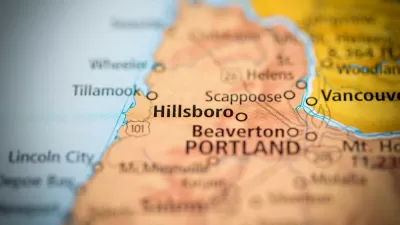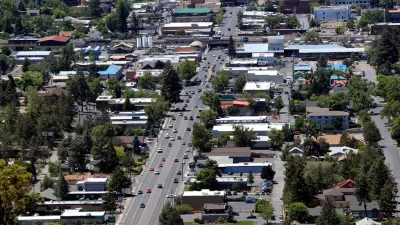The state made sweeping reforms that eliminate parking requirements in some jurisdictions, which supporters hope will lead to faster, less expensive construction and the revitalization of vacant properties and underused lots.

Writing in Sightline, Michael Andersen and Catie Gould ponder the potential impacts of Oregon’s historic parking reform legislation. “The law in question gives the state board the power to set land use rules that, among other things, ‘minimize adverse social, economic, and environmental impacts and costs.’”
The law makes parking optional in many of the state’s jurisdictions. “In some situations—within a half-mile of relatively frequent transit, for homes of 750 square feet or less, and for homes meeting affordability targets—minimum parking mandates will no longer apply for jurisdictions within Oregon’s eight largest metro areas.” Communities farther from transit are tasked with finding other ways to reduce car dependence. “The commission did decide to give the Portland metro area a bit of additional flexibility. Its regional government is allowed to come up with its own parking rules, but the state commission must sign off that they are at worst equivalent to the statewide rules.”
The law isn’t without its detractors, but, “assuming these new rules survive legal challenge, people looking to build new homes and businesses, or dreaming of renovating an older building, can look forward to deciding for themselves how much parking their property needs.”
The article lists five ways the new rules might change Oregon’s landscape:
- Increased reuse of vacant buildings
- Sharing of underused parking lots
- Faster construction
- Improved management of on-street parking and curb space
In the fifth item, the article warns not to expect too much: “Despite all this, the Oregon of 2032 will probably have more parking spaces than the Oregon of 2022. The new rules put a few new costs and limits on the size of new lots and garages but mostly just within designated ‘climate-friendly areas.’” The authors note that it will take more—infrastructure improvements, better public transit, and affordable housing near transit and businesses—to reduce the need and desire for parking in the city.
FULL STORY: OREGON JUST SLASHED PARKING MANDATES. 5 THINGS THAT MIGHT HAPPEN NEXT

Planetizen Federal Action Tracker
A weekly monitor of how Trump’s orders and actions are impacting planners and planning in America.

Map: Where Senate Republicans Want to Sell Your Public Lands
For public land advocates, the Senate Republicans’ proposal to sell millions of acres of public land in the West is “the biggest fight of their careers.”

Restaurant Patios Were a Pandemic Win — Why Were They so Hard to Keep?
Social distancing requirements and changes in travel patterns prompted cities to pilot new uses for street and sidewalk space. Then it got complicated.

Albuquerque Route 66 Motels Become Affordable Housing
A $4 million city fund is incentivizing developers to breathe new life into derelict midcentury motels.

DC Area County Eliminates Bus Fares
Montgomery County joins a growing trend of making transit free.

Platform Pilsner: Vancouver Transit Agency Releases... a Beer?
TransLink will receive a portion of every sale of the four-pack.
Urban Design for Planners 1: Software Tools
This six-course series explores essential urban design concepts using open source software and equips planners with the tools they need to participate fully in the urban design process.
Planning for Universal Design
Learn the tools for implementing Universal Design in planning regulations.
Heyer Gruel & Associates PA
JM Goldson LLC
Custer County Colorado
City of Camden Redevelopment Agency
City of Astoria
Transportation Research & Education Center (TREC) at Portland State University
Camden Redevelopment Agency
City of Claremont
Municipality of Princeton (NJ)





























